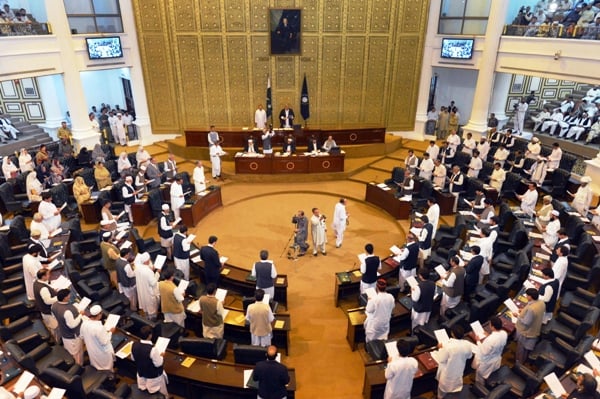
The request was included in two of the six resolutions which were passed by the Khyber-Pakhtunkhwa (K-P) Assembly on Monday.
Sahibzada Sanaullah of the Pakistan People’s Party (PPP) and Inayatullah Khan of the Muttahida Majlis-e-Amal (MMA) had moved the resolutions on migrant workers which were unanimously approved by the house.
Both resolutions state that the Pakistanis working in Saudi Arabia send remittances worth millions of rupees to the country.
At this Inayatullah demanded that the federal government make arrangements to secure the release and deportation of all those Pakistanis who had been imprisoned for problems with work permits or crimes of petty nature.
In his resolution, Sanaullah demanded that the federal government send a delegation, comprising representatives of various political parties, and meet with the Saudi government regarding the Pakistanis who are being harassed, fined and imprisoned.
Question, answer session
During the question and answer session, MMA’s Zafar Azam raised the issue of royalties for Karak oil and gas.
He claimed that a royalty fund had been set up but its money has been used to fund the Khushal Khan Khattak University in Karak.
Azam urged the government to stop this practice and instead allocate grants for the educational institute like other varsities in the province.
“The oil and gas royalty fund is supposed to be spent on the development of the district, but salaries of the university’s vice chancellor and other staff all the way down to Class-IV employees, are paid from the fund,” Azam complained, calling the practice discrimination which will fuel negative sentiments amongst the people.
“If the universities in other districts, including Swabi, Peshawar, Mardan, Hazara and Nowshera operated on the tobacco cess, royalty from forests or other such money then it is acceptable otherwise the government should own the university and start financing it like other varsities,” he said.
Zakat funds
The house ordered a departmental inquiry into alleged irregularities in the distribution of zakat funds by the Zakat and Usher department of the province.
PPP lawmaker from Upper Dir Badshah Saleh asked K-P Assembly Speaker Mushtaq Ghani to refer the issue to the respective standing committee. But Ghani and the Law Minister Sultan Khan suggested that before a committee of the house reviews the situation, a departmental inquiry should be held.
Saleh told the house that a list of names of those involved in the scandal, provided to him by the department, included some officers of the education department had received Rs9,000 from the fund.
The lawmaker said that the charity money was meant to be spent on the poor and the needy including orphans and widows.
No more tardiness
Expressing his displeasure over the tardiness of some lawmakers, Ghani directed the assembly secretary to start recording attendance of ministers and government officers who arrive at the assembly after a session has commenced, apart from noting the names of those who had skipped the session for no reasons.
This list, Ghani directed, should be sent to Prime Minister Imran Khan.
He asked ministers of the Pakistan Tehreek-e-Insaf (PTI) government to regularly attend sessions and to come prepared on issues included in the agenda.
“Those who are absent without presenting any leave application will be reported to PM Imran,” he warned.
Unblock CNICs
The house also passed a resolution which demanded to unblock the Computerised National Identity Card (CNIC) of Pashtuns—an issue which has forced them to hold daily protests.
Awami National Party (ANP) parliamentary leader Sardar Hussain Babak moved the resolution in the house stating that the CNICs of millions of families had been blocked, adversely impacting their daily life.
Inayatullah narrated the issue hardships his sister and nephew. Have had to face because their CNICs are blocked.
He asked the speaker to follow up on this resolution since it was a serious issue. The motion was passed unanimously by the house.
The house also passed another resolution demanding that members of provincial assemblies are provided with the official (blue) passport. The resolution had been moved by PPP’s Nighat Orakzai.
The blue passport is provided to Senators, MNAs, provincial ministers, judges of the Supreme Court and High Courts, Officers serving with the government and proceeding abroad on official assignments
Orakzai contended that MPAs are provided with the same facilities as members of the national assembly and the upper house of Parliament.
ANP’s Khushdil Khan moved a resolution seeking permission—as per rules— to the speaker to constitute different committees that would work in the assembly dealing various subjects.
Member-elect oath
Salahuddin Mohmand of the ANP was sworn in as a member of the K-P assembly on Monday.
Mohmand had won PK-71 Peshawar by beating K-P Governor Shah Farman’s brother. The seat had fallen vacant after Farman vacated it to take over the mantle of the provincial governor.
Salahuddin extended his gratitude to the allied opposition for making his victory possible. He vowed to shed light on his constituency’s people and the problems they face.
“The areas which comprise the PK-71 are worst-hit by the militancy. Students were sitting under a roof which was about to fall. Basic Health Units’, which had been built by the ANP government, have never been repaired while locals have been paying gas bills for the past four years without getting gas supply,” he narrated the problems in his introductory speech.
Published in The Express Tribune, October 30th, 2018.

1724238420-0/Untitled-design-(3)1724238420-0-165x106.webp)

1731678234-0/pete-(1)1731678234-0-165x106.webp)







COMMENTS
Comments are moderated and generally will be posted if they are on-topic and not abusive.
For more information, please see our Comments FAQ